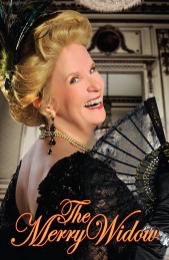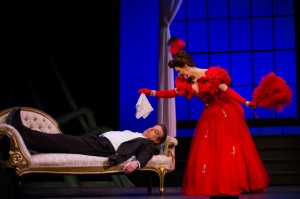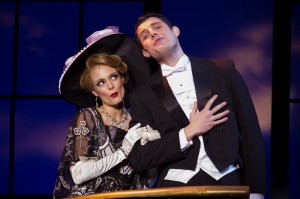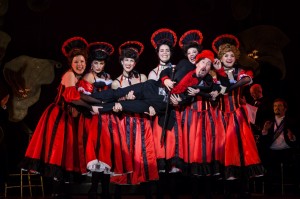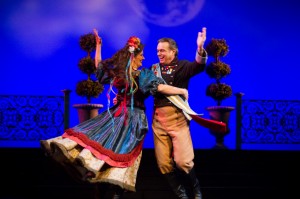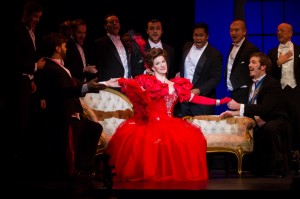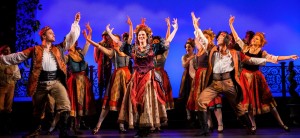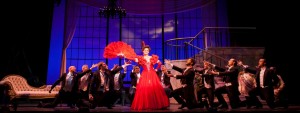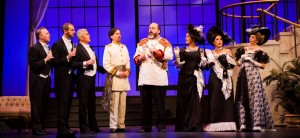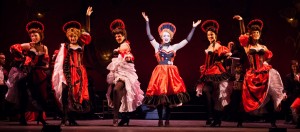IT DOESN’T GET ANY MERRIER THAN THIS
This radiant revival is Light Opera Works’ fourth coming of Franz Lehár’s masterpiece from an earlier turn of the century. Rudy Hogenmiller’s sterling staging carries more than enough jubilation to make The Merry Widow a holiday delight.
Running through the rest of the Old Year, this three-hour confection, the finest work from the “silver age” of operetta, delivers, respectively in each act, a rich musical mix of Viennese waltzes, Hungarian folk dances, and French insouciance. It’s music to melt to, effortlessly lyrical, and—even if it’s new to you—instantly nostalgic; the stuff that makes you mad the world isn’t always just like this.
Viktor Léon and Leo Stein’s libretto—full of wishful thinking turned to earned emotion—is delightfully adapted by Jack Helbig and Gregg Opelka into English (“the language of love,” as goes a running, then groaning, joke). A ton of intrigue centers on the wealthy title character Hanna Glawari and her too movable fortune.
The Parisian embassy of the Mittel-Europa principality of Pontevedro (perhaps adjacent to Offenbach’s Duchy of Gerolstein) is all atremble that Die lustige witwe (The Merry Widow) will marry an outsider. If a non-Pontevedrin spouse gets her gold, the economy will collapse, its banks stripped of her largesse. The Pontevedrin legates implore Count Danilo Danilovitch, the feckless embassy secretary who prefers to womanize at salacious Maxim’s restaurant, to woo his former lover and keep the money in the country.
Happily, Hanna still yearns for this lothario, who she hopes may have learned from his philandering errors and their botched engagement. Enraged at the mercenary lovers attracted by this widow’s inheritance, Danilo wants her to learn her lessons too. Inciting jealousy in order to provoke love requires a conventional operetta subplot. This one requires a compromising fan and the extra-marital activities of the not-so-innocent ingénue Valencienne and her suitor, the carefree Camille de Rosillon.
Framed by Adam Veness’s Art Nouveau proscenium, and richly crafted by conductor Nyela Basney, all this froufrou is just an excuse for a first act in ¾ time, a dance-happy second act set in Hanna’s trellised Parisian garden, and a cancan-festive final act in mischievous Maxim’s with its Toulouse-Lautrec-ian grisettes.
Gracing a marvelous ensemble is Stacey Tappan’s utterly charming, very merry widow. She smiles her way through the gorgeous “Villa,” a song about a wood nymph and her huntsman that is among many notes she turns to gold. A Chicago treasure, Larry Adams brings wry maturity and a potent twinkle to Danilo’s world-weary persona, then mellows it in pure rhapsody as he intones the famous waltz that writes itself each time you hear it.
Sprightly comic support comes from Brian Rooney as an epicene Pontevedrin clerk who has his own secret identity at Maxim’s, as well as Sarah Wasserman and William Dwyer as the odd couple out who delight to sing Lehar’s more vaudevillian duets. Alex Honzen is dapperly dour as envoy Baron Mirko Zeta, Valencienne’s cluelessly cuckolded husband.
The costumes, by Jesus Perez and Jane Debondt, range from the first act’s black-and-white, Cecil Beaton-style raiment of La Belle Époque (a total contrast to Hanna’s remarkably red gown) to the second act’s Pontevedrin native wear to the sinfully scarlet outfits of Maxim’s high-kicking soubrettes.
You couldn’t end 2014 on any higher notes.
production photos by Mona Luan
poster photo by Rich Foreman
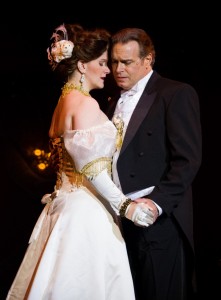 The Merry Widow
The Merry Widow
Light Opera Works
Cahn Auditorium
600 Emerson Street in Evanston
scheduled to end on December 31, 2014
for tickets, call 847.920.5360
or visit Light Opera Works
for more shows, visit Theatre in Chicago
